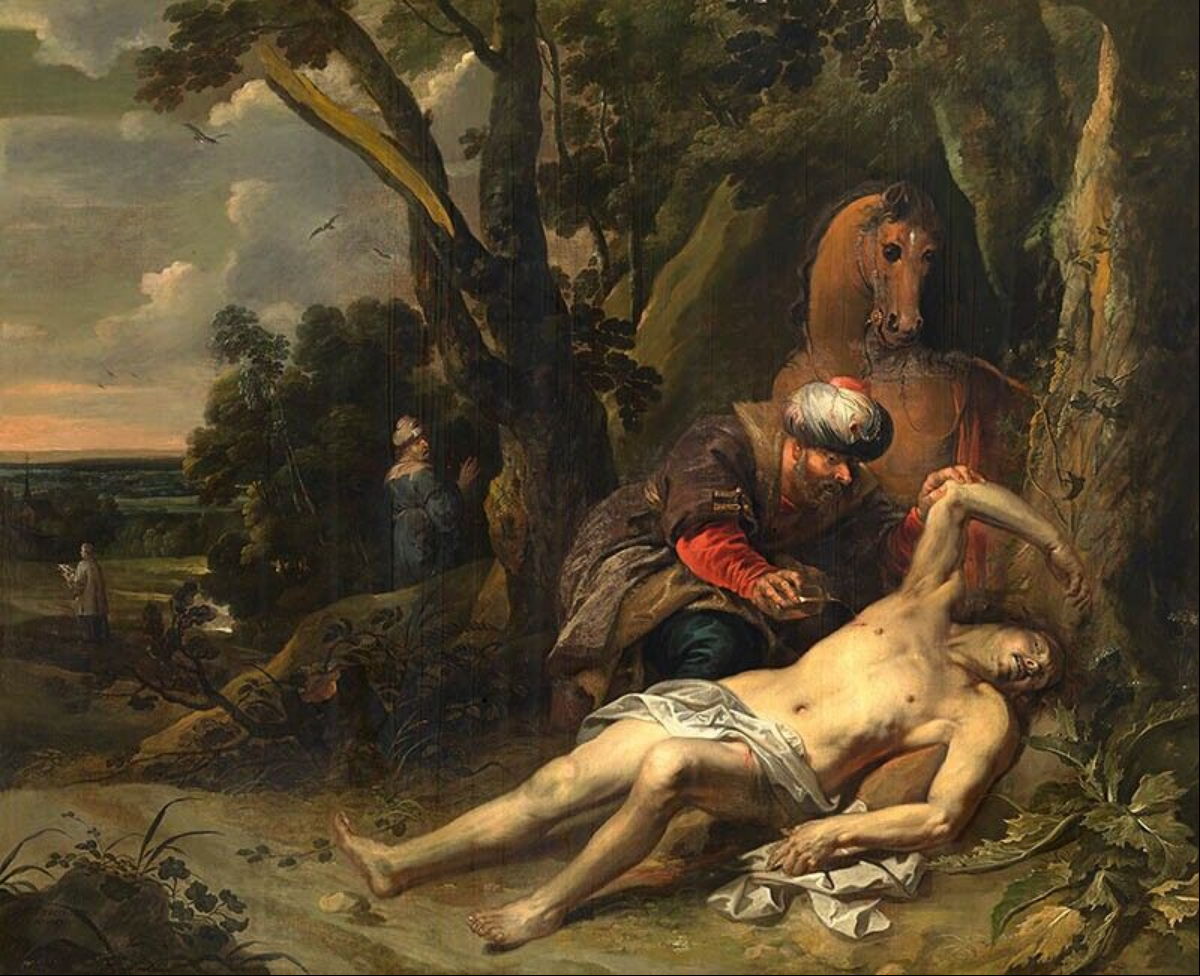I am on vacation this week, so I won't be posting a reflection piece for Pentecost 4. Please see the Featured Post at right for commentary on that week's lesson. OG
 |
| "Paraable of The Good Samaritan" Balthesar van Cortbemde (Flemish, 1647) |
“No, the word is very near to you; it is
in your mouth and in your heart for you to observe.” (Deuteronomy 30:14)
I was raised by politically conservative
parents. Yup. Mom and Dad were folks who believed it was better to have too
little government than too much. I’m not really sure how my dad came to be a
conservative—and he made Archie Bunker look like a moderate—but I think it
might’ve started as a reaction against his dictatorial and ultra-liberal
Cornish grandfather. My great grandad loved the fact that his adopted country
gave women the vote. He could line his daughters up and tell them exactly how they, as obedient and
subservient children, should cast their ballots. I think my dad became a
conservative just to spite the old geezer. That, or his post-combat experience
in Germany after World War II gave him a deep distrust of the Soviet Union and
anything even remotely connected to it—like socialism.
My mom was a different story. She was
logical to the core. I remember her asking, “Why should I pay taxes to protect
someone else from the consequences of their own stupidity?” Mother believed
that you earned what you got, and if you didn’t get it, you didn’t earn it.
I’ll admit, she had a point.
It’s that point, however, that gets put to
the test by the Gospel lesson for Pentecost 5, Year C (Luke 10:25-37), the
famous parable of the Good Samaritan. Jesus and the Law of Moses referenced in
this passage tell us unambiguously that we are to love our neighbor. So what
does the lawyer in the story do? He asks Jesus to define neighbor. I mean, you wouldn’t want to accidentally love
someone who wasn’t entitled to that
love, now would you?
The priest and the Levite (a temple
assistant) who each encountered the wounded, bloody victim of the assault
didn’t stop to help him. Possibly they feared that the violent assailants might
still be hiding around the next rock or something. Or, perhaps, being religiously
observant men, they chose not to touch the injured man out of fear of
contaminating themselves with his icky blood. We might even suspect that they
felt no obligation to help this poor soul because traveling was dangerous and
the guy should’ve known better than to be going from Jerusalem to Jericho by
himself. They might’ve blamed the victim. It was his own fault for getting mugged and rolled, the dumb jerk!
What is crystal-freaking-clear in the
passage, however, is Jesus’ belief that neighborliness—the obligation to be
merciful—crosses the borders of nationality, race, and religion. Who is my
neighbor? The one who shows me mercy like the heretic Samaritan in the parable.
“Go and do likewise,” Jesus says to the lawyer. And he didn’t stutter.
Why provide healthcare for the indigent?
Because the poor are our neighbors. Why welcome the asylum seekers? Because the
refugees and the persecuted are our neighbors. Why provide quality public
education for all? Because the children are our neighbors. Why send food
supplies and medical aid around the globe? Because the oppressed are our
neighbors. Why does my congregation grow vegetables on our lawn for the poor and
sleep homeless people in our basement? Because they’re our neighbors.
The Bible enjoins us to practice a
compassionate generosity. Yes, I’ll admit it is possible to be too merciful and
turn compassion into enabling. I’ll even go farther and confess that there are
some unscrupulous folks who will take advantage of the generosity of others.
But I don’t really care. I think the principle we need to follow as Christians
in our public life is to love our neighbors without qualifications. For my
money, it’s far worse to do too little than to do too much. Besides, if we were
really to ask the question of worthiness, would any of us sinners merit what we
have?
The political question never really
changes. It always boils down to this: What are the responsibilities and limitations
of our government? We go back and forth with this in America all the time. But
one thing doesn’t change: If we’re truly Christians, we must love our neighbor.
We can debate the best way to do this as a society, but we cannot deny Christ’s
command to do it.
Thanks, as always, for reading. Let me
know what you think, okay?
No comments:
Post a Comment